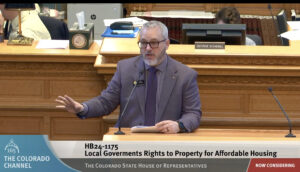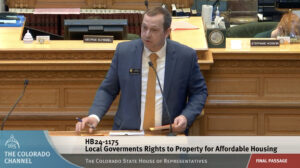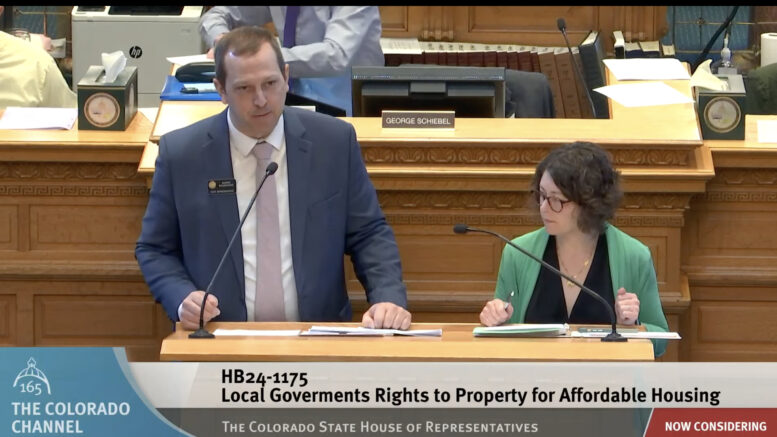After even more changes, Colorado House members on Monday passed a revamped bill to give local governments rights of first refusal and first offer on certain apartment complexes, one year after Gov. Jared Polis vetoed a more expansive version of the proposal.
Industry leaders and House Republicans offered appreciation for the changes, which include shorter timeframes for governments choosing to use the proposed right of first refusal and an increase in minimum units for those using the right of first offer. But both groups said that the changes didn’t go far enough to curbing the threat that the bill could stall transactions and leave investors much less likely to put money into Colorado at a time when the state needs more housing stock.
House Bill 1175 — which like its vetoed predecessor is sponsored by Democratic Reps. Andy Boesenecker of Fort Collins and Emily Sirota of Denver — would permit counties and cities to get the first shot at buying certain multifamily properties that go up for sale. The new bill limits eligible properties to ones that already are covenanted with below market rates already but are within two years of losing those income restrictions and are going on the market — a portfolio that Boesenecker estimates at some 1,400 properties.
But it also creates a new right of first offer that would give governments 14 days upon learning of a pending sale opportunity to claim that right, then take 45 days to make an offer if they choose to do so. Sellers could choose to accept or decline the offer, which could only be placed on complexes that are at least 30 years old and have at least 15 units.
What is “un-American”?
Before the bill received final House approval Thursday in a 38-23 vote — with six Democrats joining all Republicans who were present in voting against it — GOP lawmakers complained that HB 1175 not only would slow commerce but is “un-American.” Rep. Scott Bottoms, R-Colorado Springs, led the opposition, saying that the bill undermines the fundamental principle that property owners can choose to sell what they own to whoever they want rather than having to clear such transactions with a government.

Colorado state Rep. Scott Bottoms speaks Friday on House Bill 1175.
“I strongly disagree with this concept. We’re saying the government can have the first right of refusal to a property,” Bottoms said. “This is not only a bad bill. It is not a democratic republic type of bill. It is the exact opposite of that.”
Boesenecker said the idea that he finds un-American is the thought that lower- or middle-income individuals living and working in communities could no longer stay there because they housing that they counted upon has been sold and had rents increased significantly. He believes that the bill will be used sparsely by local governments with limited budgets that see opportunities to preserve aging or covenanted below-market-rate housing but that such a power will keep service and public professionals from being pushed out of homes.
“We have always been concerned for and looking out for our neighbors and doing whatever we can,” Boesenecker said Monday, emphasizing that many covenanted affordable-housing developments already have gotten tax credits to get them built. “This simply says that we as a state acknowledge that commitment and will leverage our public dollars in the same way they’ve already agreed to use them.”
Potential effect on apartment construction
Industry opponents — including the Colorado Real Estate Alliance and Colorado Bankers Association — told the House Transportation, Housing and Local Government Committee in February that HB 1175 could chill investment in multifamily-housing. Deals often are consummated quickly — not on the ROFO timeline that also would give governments 59 days to make an offer and another 60 to close it if accepted — and many investors would choose to avoid Colorado for states with less regulations, they said.

Colorado state Rep. Andy Boesenecker speaks Monday on House Bill 1175.
That in turn would exacerbate the affordable-housing crisis rather than lessen it as Boesenecker said HB 1175 would do, as construction of apartments could slow at a time when studies already say the state needs some 120,000 more units to meet existing need. Gov. Jared Polis is pushing a package of bills that seek to address the affordability crisis by spurring construction of more residences in transit-oriented communities and via new accessory dwelling units, and he’s said he’d oppose bills that could be hurdles to building.
While some local governments, particularly around the Washington D.C. area, have implemented right-of-first-refusal laws, Colorado would be the first state to grant such rights to all its cities and counties.
What’s next
The bill now heads to the Senate, which added several major restrictions last year before passing it onto Polis. The Democratic governor still vetoed the bill that sought to grant local governments the right of first refusal over older apartment complexes going up for sale, saying it would “discourage investment at a time when the market cannot bear much risk.”
Destiny Bossert, government affairs manager for the Colorado Apartment Association, said after Monday’s House approval that the bill needs to be narrowed further to avoid major negative repercussions to the market. Specifically, the CAA wants the right-of-first-refusal provisions stripped entirely from HB 1175 and the right-of-first-offer provisions limited to the same covenanted affordable housing on which the bill would offer first-refusal rights.
“We appreciated the amendments that were made in the house to put guardrails in place on the process as a whole, but we are still very much opposed to the bill,” Bossert wrote in a statement to The Sum & Substance. “The Apartment Association does not intend to move off of our opposition with ROFR still in the bill — which we believe is aligned with Governor Polis’ veto letter to the bill that he vetoed last legislative session.”
